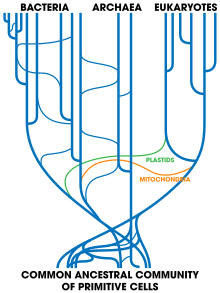基因水平转移
外观
此条目需要扩充。 (2014年2月9日) |
此条目需要精通或熟悉相关主题的编者参与及协助编辑。 |


基因水平转移(英语:horizontal gene transfer,缩写:HGT)又称水平基因克隆、"横向转基因"或基因侧向转移(lateral gene transfer,缩写:LGT),指生物个体之间互相遗传物质而通过生殖将其传给子代的过程。基因水平转移对于细菌的进化至关重要,但高等生物也会发生基因水平转移[2][3]。
在细菌之中,基因水平转移的常见途径包括接合、转导及转化[4]。质粒与温和噬菌体是常见的细菌基因水平转移的载体[5][6]。例如,在细菌获得抗生素抗药性过程中,抗药性基因可通过基因水平转移迅速在细菌之间传播,最终使整个菌群快速获得对抗生素的抗药性[7][8][9][10]。
历史
[编辑]生物学史上的经典实验之一的格里菲斯实验中,无毒性的R型肺炎链球菌与高温杀灭的有毒性的S型肺炎链球菌混合后注射入小鼠体内,R型肺炎链球菌会转化成有毒性的S型肺炎链球菌将小鼠杀死。只是当时的人们尚不清楚这一现象是由基因水平转移造成的,也不知道这一现象背后的机制就是R型肺炎链球菌摄取了S型肺炎链球菌的质粒进而转变成了S型肺炎链球菌[11][12]。
直到1951年,科学家才第一次真正发现基因水平转移现象。当时,困扰医学界的一个问题是,许多白喉患者很早就感染了病原体白喉棒杆菌但并不发病,而是在某一个时间节点后才突然发病。在对这一现象的研究过程中, 巴斯德研究所的安德列·利沃夫团队发现这背后的原理是一个病毒基因转入白喉棒杆菌后,弱毒性的白喉棒杆菌菌株会转变成强毒性的菌株,因此使病人突然患上白喉[13]。安德列·利沃夫后来因为这项工作获得了1965年的诺贝尔生理医学奖[14]。1959年,科学家从不同物种的细菌之间传递抗生素抗药性的过程中发现了细菌与细菌之间的基因水平转移[15][16] 。
基因水平转移生物
[编辑]参考文献
[编辑]- ^ Sidney K. Pierce, Xiaodong Fang, Julie A. Schwartz, Xuanting Jiang, Wei Zhao, Nicholas E. Curtis, Kevin M. Kocot, Bicheng Yang, Jian Wang. Transcriptomic Evidence for the Expression of Horizontally Transferred Algal Nuclear Genes in the Photosynthetic Sea Slug, Elysia chlorotica. Molecular Biology and Evolution. 2012-06-01, 29 (6): 1545–1556 [2018-04-02]. ISSN 0737-4038. doi:10.1093/molbev/msr316. (原始内容存档于2018-06-01) (英语).
- ^ Gyles C, Boerlin P. Horizontally transferred genetic elements and their role in pathogenesis of bacterial disease. Veterinary Pathology. March 2014, 51 (2): 328–40. PMID 24318976. S2CID 206510894. doi:10.1177/0300985813511131.
- ^ Vaux F, Trewick SA, Morgan-Richards M. Speciation through the looking-glass. Biological Journal of the Linnean Society. 2017, 120 (2): 480–488. doi:10.1111/bij.12872
 .
.
- ^ Horizontal and vertical: The evolution of evolution - life - 26 January 2010 - New Scientist. [2010-01-29]. (原始内容存档于2015-04-02).
- ^ Naik GA, Bhat LN, Chpoade BA, Lynch JM. Transfer of broad-host-range antibiotic resistance plasmids in soil microcosms. Curr. Microbiol. 1994, 28 (4): 209–215. doi:10.1007/BF01575963.
- ^ Varga M, Kuntova L, Pantucek R, Maslanova I, Ruzickova V, Doskar J. Efficient transfer of antibiotic resistance plasmids by transduction within methicillin-resistant Staphylococcus aureus USA300 clone. FEMS Microbiol. Lett. 2012, 332 (2): 146–152. PMID 22553940. doi:10.1111/j.1574-6968.2012.02589.x.
- ^ OECD, Safety Assessment of Transgenic Organisms, Volume 4: OECD Consensus Documents, 2010, pp.171-174
- ^ Kay E, Vogel TM, Bertolla F, Nalin R, Simonet P. In situ transfer of antibiotic resistance genes from transgenic (transplastomic) tobacco plants to bacteria. Appl. Environ. Microbiol. July 2002, 68 (7): 3345–51 [2014-02-09]. PMC 126776
 . PMID 12089013. (原始内容存档于2020-06-05).
. PMID 12089013. (原始内容存档于2020-06-05).
- ^ Koonin EV, Makarova KS, Aravind L. Horizontal gene transfer in prokaryotes: quantification and classification. Annu. Rev. Microbiol. 2001, 55: 709–742 [2014-02-09]. PMID 11544372. doi:10.1146/annurev.micro.55.1.709. (原始内容存档于2019-09-19).
- ^ Nielsen KM. Barriers to horizontal gene transfer by natural transformation in soil bacteria. APMIS Suppl. 1998, 84: 77–84. PMID 9850687.
- ^ Lorenz MG, Wackernagel W. Bacterial gene transfer by natural genetic transformation in the environment. Microbiological Reviews. September 1994, 58 (3): 563–602. PMC 372978
 . PMID 7968924. doi:10.1128/MMBR.58.3.563-602.1994.
. PMID 7968924. doi:10.1128/MMBR.58.3.563-602.1994.
- ^ Downie AW. Pneumococcal transformation--a backward view. Fourth Griffith Memorial Lecture (PDF). Journal of General Microbiology. November 1972, 73 (1): 1–11 [2023-08-10]. PMID 4143929. doi:10.1099/00221287-73-1-1
 . (原始内容存档 (PDF)于2012-03-02).
. (原始内容存档 (PDF)于2012-03-02).
- ^ Freeman VJ. Studies on the virulence of bacteriophage-infected strains of Corynebacterium diphtheriae. Journal of Bacteriology. June 1951, 61 (6): 675–88. PMC 386063
 . PMID 14850426. doi:10.1128/JB.61.6.675-688.1951.
. PMID 14850426. doi:10.1128/JB.61.6.675-688.1951.
- ^ André Lwoff (1965). "Interaction among Virus, Cell, and Organism" (页面存档备份,存于互联网档案馆). Nobel Lecture for the Nobel Prize in Physiology or Medicine.
- ^ Ochiai K, Yamanaka T, Kimura K, Sawada O. Inheritance of drug resistance (and its transfer) between Shigella strains and Between Shigella and E. coli strains. Hihon Iji Shimpor. 1959, 1861: 34 (日语).
- ^ Akiba T, Koyama K, Ishiki Y, Kimura S, Fukushima T. On the mechanism of the development of multiple-drug-resistant clones of Shigella. Japanese Journal of Microbiology. April 1960, 4 (2): 219–27. PMID 13681921. doi:10.1111/j.1348-0421.1960.tb00170.x
 .
.
- ^ 整個世界都是我的裝備庫!來看看地表最強的水熊秘訣. PanSci 泛科学. 2015-12-02 [2017-03-09]. (原始内容存档于2017-03-25) (中文(台湾)).
